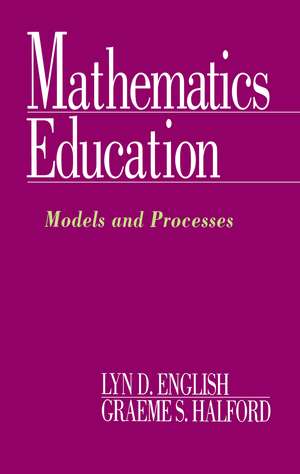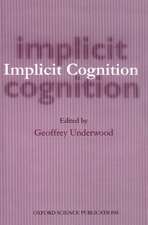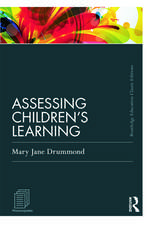Mathematics Education: Models and Processes
Autor Lyn D. English, Graeme S. Halforden Limba Engleză Hardback – iul 1995
Not simply an application of cognitive science, however, this book provides a new perspective on mathematics education by examining the nature of mathematical concepts and processes, how and why they are taught, why certain approaches appear more effective than others, and how children might be assisted to become more mathematically powerful. The authors use recent theories of analogy and knowledge representation -- combined with research on teaching practice -- to find ways of helping children form links and correspondences between different concepts, so as to overcome problems associated with fragmented knowledge. In so doing, they have capitalized on new insights into the values and limitations of using concrete teaching aids which can be analyzed in terms of analogy theory.
In addition to addressing the role of understanding, the authors have analyzed skill acquisition models in terms of their implications for the development of mathematical competence. They place strong emphasis on the development of students' mathematical reasoning and problem solving skills to promote flexible use of knowledge. The book further demonstrates how children have a number of general problem solving skills at their disposal which they can apply independently to the solution of novel problems, resulting in the enhancement of their mathematical knowledge.
| Toate formatele și edițiile | Preț | Express |
|---|---|---|
| Paperback (1) | 462.54 lei 6-8 săpt. | |
| Taylor & Francis – iul 1995 | 462.54 lei 6-8 săpt. | |
| Hardback (1) | 1011.33 lei 6-8 săpt. | |
| Taylor & Francis – iul 1995 | 1011.33 lei 6-8 săpt. |
Preț: 1011.33 lei
Preț vechi: 1233.33 lei
-18% Nou
Puncte Express: 1517
Preț estimativ în valută:
193.52€ • 206.94$ • 161.35£
193.52€ • 206.94$ • 161.35£
Carte tipărită la comandă
Livrare economică 17 aprilie-01 mai
Preluare comenzi: 021 569.72.76
Specificații
ISBN-13: 9780805814576
ISBN-10: 0805814574
Pagini: 372
Ilustrații: illustrations
Dimensiuni: 152 x 229 x 32 mm
Greutate: 0.77 kg
Ediția:1
Editura: Taylor & Francis
Colecția Routledge
Locul publicării:Oxford, United Kingdom
ISBN-10: 0805814574
Pagini: 372
Ilustrații: illustrations
Dimensiuni: 152 x 229 x 32 mm
Greutate: 0.77 kg
Ediția:1
Editura: Taylor & Francis
Colecția Routledge
Locul publicării:Oxford, United Kingdom
Public țintă
ProfessionalCuprins
Contents: Preface. Cognitive Psychology and Mathematics Education. Cognition and Cognitive Development. Cognitive Models and Processes in Mathematics Education. Numerical Models and Processes. Elementary Computational Models and Processes: Addition and Subtraction. Elementary Computational Models and Processes: Multiplication and Division. Advanced Computational Models and Processes. Problem Solving, Problem Posing, and Mathematical Thinking. Reflections and Recommendations.
Recenzii
"Traces history of the psychology of mathematics education, and summarizes principles of cognition and cognitive development....Valuable reference for mathematics educators and graduate students."
—The American Mathematical Monthly
"...This is a valuable book in what it offers and deserves a place in the library of psychology, mathematics and education departments."
—British Journal of Educational Psychology
—The American Mathematical Monthly
"...This is a valuable book in what it offers and deserves a place in the library of psychology, mathematics and education departments."
—British Journal of Educational Psychology
Notă biografică
Lyn D. English, Graeme S. Halford



















